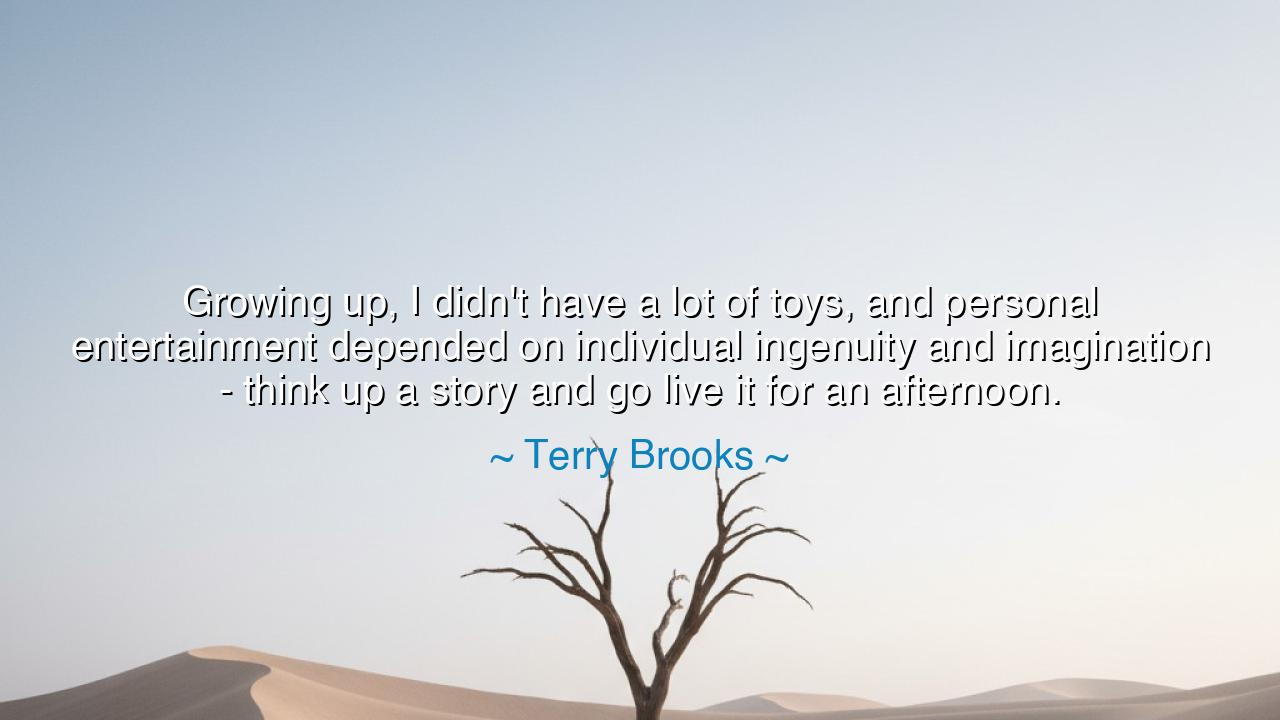
Growing up, I didn't have a lot of toys, and personal
Growing up, I didn't have a lot of toys, and personal entertainment depended on individual ingenuity and imagination - think up a story and go live it for an afternoon.






Hearken, O children of the ages, to the reflective words of Terry Brooks, who recalls the fertile soil of his youth: “Growing up, I didn't have a lot of toys, and personal entertainment depended on individual ingenuity and imagination—think up a story and go live it for an afternoon.” In this declaration, we perceive an eternal truth: the limitations imposed upon the young are often the forge in which creativity, resourcefulness, and wonder are tempered. What the world withholds in objects, it bestows in opportunity for invention and imagination.
Since the dawn of civilization, children have relied upon the power of imagination to transform the ordinary into the extraordinary. In the villages of ancient Mesopotamia, youth created games, tales, and rituals from the simplest materials—sticks, stones, and the fertile ground of their minds. Brooks’ reflection mirrors this ancient practice: when entertainment is scarce, the mind becomes a crucible, transforming thought into action, and imagination into adventure, cultivating ingenuity that endures into adulthood.
Consider the story of William Shakespeare, who as a child had neither abundance nor luxury, yet possessed an imagination that would reshape the world of theater. Through the conjuring of stories in his mind, acting them out with companions, and observing the human condition, he learned the art of narrative and drama. Like Brooks, he relied on imagination and personal initiative to transform his environment into a stage, discovering in scarcity the seeds of creative genius.
Brooks’ reflection also illuminates the value of self-directed play. By inventing narratives and embodying them, the young develop problem-solving skills, empathy, and the capacity to envision alternative realities. This form of play is not idle; it is a rehearsal for life, training the mind to navigate complexity, to negotiate with others, and to discover courage and creativity within oneself. The ancients recognized such play as sacred, for it nurtures both character and skill.
The lesson is profound: limitation fosters ingenuity. When resources are scarce, the young learn to invent, adapt, and explore, exercising imagination and initiative. By creating stories and living them, one hones the faculties of observation, reflection, and emotional engagement. These experiences become the scaffolding upon which the mind, spirit, and future creativity are built.
Practical guidance emerges from this insight. Encourage youth to craft their own stories, to transform the ordinary into the extraordinary, and to embrace play that challenges the mind as well as the body. Set aside devices and distractions, and allow the imagination to roam freely. In doing so, creativity is cultivated, self-confidence strengthened, and problem-solving sharpened, all through the simple act of inventing worlds and roles.
Brooks’ words also remind us of the enduring power of imagination across generations. Even in adulthood, the skills honed through self-directed, imaginative play enable innovation, empathy, and resilience. Those who learned to conjure worlds from nothing possess the ability to envision, create, and inspire, turning scarcity into opportunity and thought into action.
Thus, heed the eternal teaching of Terry Brooks: the absence of abundance is not a hindrance, but a call to creativity, ingenuity, and imagination. Embrace limitation as a teacher, invent your stories, and live them fully. In this way, the youthful mind cultivates strength, resourcefulness, and wonder—a legacy that will illuminate every path of life, guiding future generations toward wisdom, creativity, and fulfillment.






AAdministratorAdministrator
Welcome, honored guests. Please leave a comment, we will respond soon